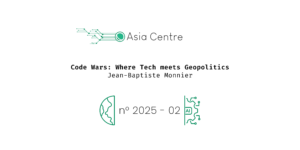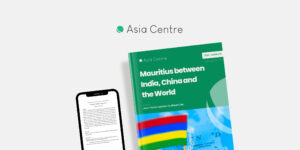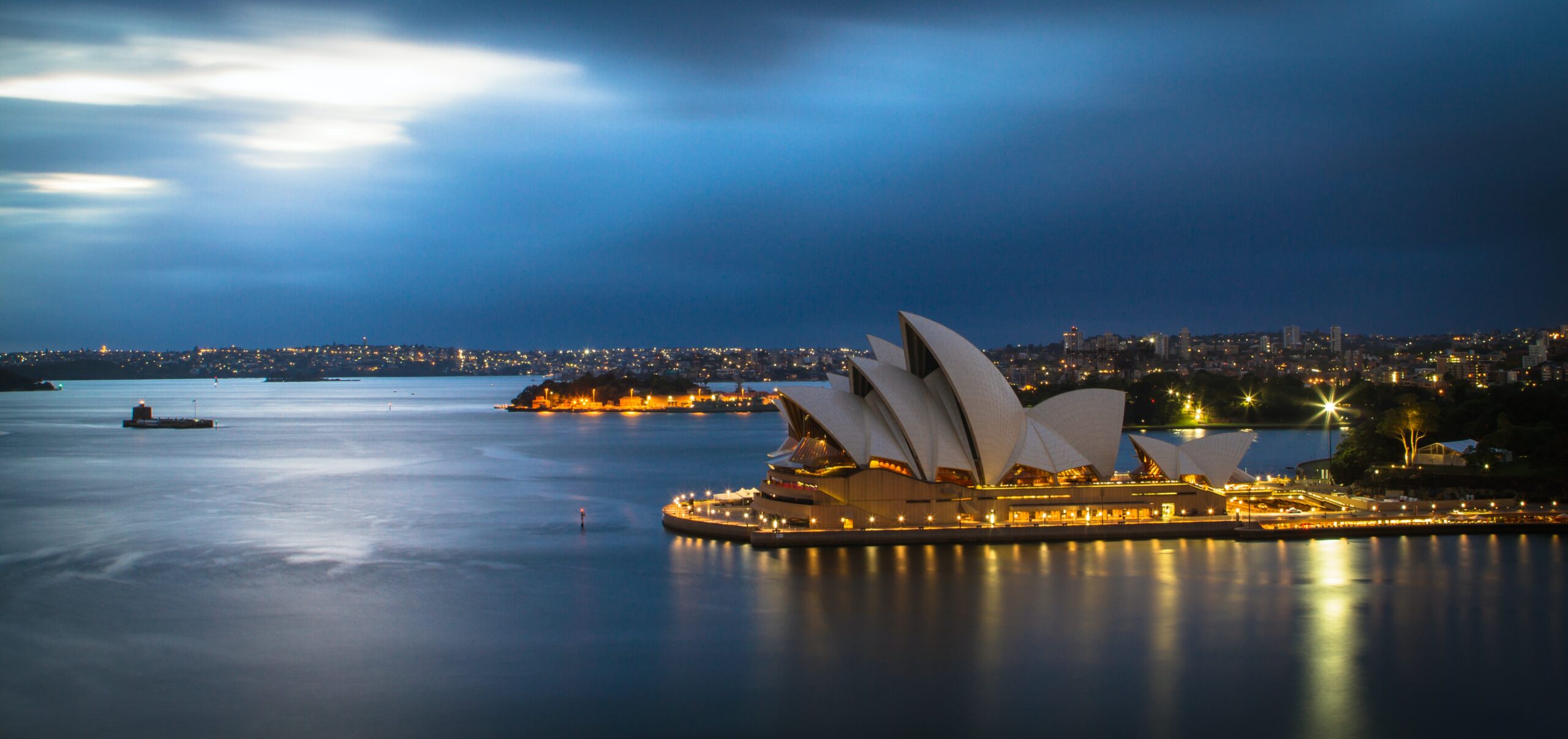Thursday, 21 November 2019
Paris, 75115
Based on a “shared heritage” in the Pacific, French President Emmanuel Macron had outlined in 2018 projects to strengthen cooperation with India and Australia upon security, economy and environment matters. As Chinese influence grows in the area (namely through massive infrastructure projects part of the worldwide “Belt and Road Initiative”), the Indo-Pacific concept reinforces around preoccupations shared by the Quad democracies – mainly the importance of preserving the “rules” shaping today’s economic environment.
Mr Steve Howard, Secretary General of the Global Foundation and a global strategist with 20 years of experience working with China, highlighted France (“back in a renewed way as a global diplomatic power”) has a crucial role to play in the Pacific’s geo-strategy, currently dominated by challenging trends.
***
China’s emergence in the world
For a long time, China never reached outside its borders and provided for its own necessities; but in 20 years, the country has changed dramatically. China’s emergence in the world is the biggest event of our lifetimes with, in the process, 700 million people lifted out of poverty. While the country may first have seemed to become progressively like the West, it became clear that it is rather absorbing many things about the Western lifestyle while, in fact, becoming more and more Chinese. In many ways, China is still learning how to express its rights, and worries less about fitting in than learning how to play by the international rules in order to find its own way.
In 2013, President Xi Jinping announced the establishment of the Asian Infrastructure Development Bank, unexpected by any of the regional actors but that Australia joined by June 2014 (after France and the UK). The Chinese finance minister then claimed that this greatly successful international institution would build best practices – but allegedly, “who’s best practices are we talking about?”. China hence shows that their standards won’t necessarily fall in line with what Western countries, who have been assuming unconditional compliance under the Bretton Woods system, are expecting them to be.
How to handle this? Some consider that after 500 years of civilization, the West had its time and should now make way for a global rebalancing. Regardless, in the last 3-4 years, this has been a poisonous and binary topic in Australia, and has led to a concerning attitude from most of the West leaders who seem to be sleepwalking into the future.
A dialog of civilizations
40% of Australian exports goes to China, including resources such as iron and liquid natural gas, but also higher education and tourism. If China decided to shift their priorities, the Australian economy, after 28 years of uninterrupted growth, would go into recession. Canberra has long had a sophisticated China strategy and was, until 4 or 5 years ago, on the tracks to be their best chance of understanding the Western world. This particular relation of goodwill, confidence and bridging practices has not gone away completely, but Australia is unfortunately no longer clear on its own strategy, whereas China needs confident and long-term interlocutors to work with.
On this issue, France brings a specific mentality to the world politics that is both refreshing and lonely, given the trend of polarized selfishness and triviality that currently dominates Western attitudes. With a certain structure of the world falling apart, the main challenge that should be overcome and addressed by all is the following: how to animate unified talks and bring those of different persuasions into the table? It certainly cannot be done without trust and confidence.
When Xi Jinping relaunched the Belt and Road Initiative in May 2017, he talked about vision; beyond the practical execution of this project, his speech addressed the next level of international practices in terms of rules and standards. On the third level, he was offering to engage a dialog between cultures and civilizations. Westerners need to go back to a higher level of conversation with China and recognize, firstly, that our values are completely different; secondly, that our interests may compete but sometimes still be in line.
France in the Pacific
Currently, France’s most important commercial contract happens to be with Australia, where a French company is building defence submarines; such a high level of cooperation would never have been considered 20 years ago. Investing 2 billion dollars per year in the Pacific, France, who’s largest common border is also with Australia, proves a crucial and very stable neighbour for Canberra who, as a mid-level power, needs to engage in such partnerships.
There is a specific project, Antarctica, that embodies a profound history of collaboration and a great potential for working towards the future. Rather than sovereignty, it is treaties, codes and agreements that govern the continent – where Australia remains the main superpower. Still, the preservation of its environment is week, because the Chinese (who claim their need of fishing to feed their population) do not take part in negotiations. Hence, the machinery to keep Antarctica secure for the future does not exist yet. It should be set through a new governance that both countries, who are major regional actors, could build together as an expression of how the world needs to work together for peace and development.
The Indo-Pacific concept’s only purpose is to exclude one big nation. On the contrary, France has a specific opportunity to hold multilateralism together and to show leadership by offering China, and others, to participate in a coalition of the willing.
***
Q&A
Westerners all use the same word: multilateralism, which, translated in Chinese characters, sounds more like bilateralism or an addition of bilateralisms. Hence, concepts such as the “Indo-Pacific” are quite itching for China. Can this triangle of several interpretations really succeed in making Australia, France and China work together?
Such words must be anchored up in practical actions, beyond the rhetoric. The AIIDB is a multilateral institution, that Pacific countries are now joining. Multilateral financing is a much better perspective than competitive financing – even if Australia is the biggest aid donor. The Prime Minister went to the most recent Pacific meeting with an extra 500 million dollars in grants and loans, but Pacific islands are more interested by commitments and actions on issues such as Climate Change than returnable money. The patronizing approach doesn’t work anymore, while a collaborative will.
The idea of the Indo-Pacific concept (a social-political construct indeed, as is Asia-Pacific), is to put Japan into the picture. With the prospect of having a dialog of civilizations, where do you place this country (a democracy and the third economy of the world)?
Japan is incredibly important, although running a careful line to keep balancing their US relationship. Japan’s engagement with China has resulted in a remarkably improved relationship as they are now co-dependent to a great extent.
The Indo-Pacific is a semantic question which appears as a specific rebuff to China. And to not mention them in the area where we live is to be missing something obvious. Global view is not about compartmentalizing; a containment of China is just not going to work.
You’re showing a lot of optimism in China’s willingness to have a leading role in global meetings, but is it really feasible in this current context of economic tensions (such as the trade war with the US)?
There is no certainty nor a silver bullet pathway; but there should simply not be a binary world that ostracises a China-centric system. Furthermore, the unique-power era is now fading and shifting towards a multi-power trend. In this fluid, unresolved and messy perspectives, we need relevant vehicles (such as the Paris Peace Forum) to figure out the principles on which we can agree. It would certainly help if Europe was better unified; in this modern history, it is bizarre that Britain and the US are focusing on selfish priorities such as the Brexit or America first.
The West has not given China (and other growing countries such as India) enough strategic space to rise on their own, which has reflected on the Bretton Woods institutions. Most of all, the era of governments having an exclusive lead on foreign relations is over. Private diplomacy encompasses a crucial role.
China only announced in 2016, extremely recently, its political commitment to embrace economic globalization. Of course, they are leaning and using unbalanced leverage in developing countries – which is what powerful countries do. What matters is negotiating and navigating. But China can’t deal with an international environment without people to work with; they need other countries that are smart and confident enough to engage.
Some countries’ reluctance to engage comes from the fact that China generates fear. Their ability to transform reefs into fully equipped military facilities in contested areas, for instance, does not encourage closer cooperation. How to reconcile the defence aspect with other cooperation perspectives?
Defence interests may soon be resolved in cyber security over military hardware. Hard-defence assets should be married with hard-defence thinking. On issues where China threatens sovereignty and territoriality, Australia needs to act, in reference to the appropriate set of rules. But while having imposed the existing international order, Western countries should be careful on lectures about rules and norms of behaviour. Defence escalation is worrying, and China will most likely be more expansive in the defence of their territory, which requires a strategy. But peace building is always preferable to hard assets of defence. Australia has always taken an insurance security from someone else. At the moment, there is not enough (official and informal) bridge building. Perhaps the country should embrace that its most important economic partner is not going to be a strategic partner.
The US strategic alliance and China’s increasing economic partnership to the level of creating an economic dependence is a dilemma. What will be Australia’s strategy, given the deepening current tensions?
The Us are indeed watching what the Australian behaviour will be; the long-maintained ambiguity will become impossible to hold. The country had an easy ride on both the American security guarantee and the Chinese economic guarantee which, Canberra realizes are no longer to be taken for granted. We have to be as active in the middle of that as possible. Things don’t have to be binary, but Australia needs to take an active posture in the discussions, in order to find a path somewhere in the middle ground.
The only weight to match China in the next 10-20 years is the European Union, while the United states are going down a difficult path. Ursula von der Leyen announced her agenda to make the EU a geopolitics actor and extend the region’s external budget by 30%. There is a role model of cooperative globalization to assert.
Given the Sino-American strategic rivalry, how to convince European leaders to be more involved in the Pacific (where France is the only EU country to have a geopolitical presence)?
While the Americans have been off the field for 20 years, Australia’s well-intended strategic focus remained poor and was awaken by China’s presence. In this context, France should be highly concerned about the Pacific islands political structures.
Furthermore, to really act together on climate action would be profound; for instance, a transition from diesel fuels to renewable energy is a concrete joint strategy and a shared ambition, although commercially difficult. The islands need to be shown solidarity and that they matter. The business model of “converting the Pacific to renewable energy”, using technologies as an investment, would work. China could even come on board.
What is the current status of Australian opinion about China, compared to 10-15 years ago?
It has become more polarized, including among the Chinese Australians. This difficult subject is even more complicated by the fact that Chinese entrepreneurs have been carrying donations to political parties. But the demonization of China is troubling and shows cultural arrogance. Despite being an immigration country, Australia demonstrates a superiority attitude and is becoming more of an island than it should be, fearful of powerful allies as they emerge. China also needs to change their habits by developing a soft power strategy, which they badly lack.




